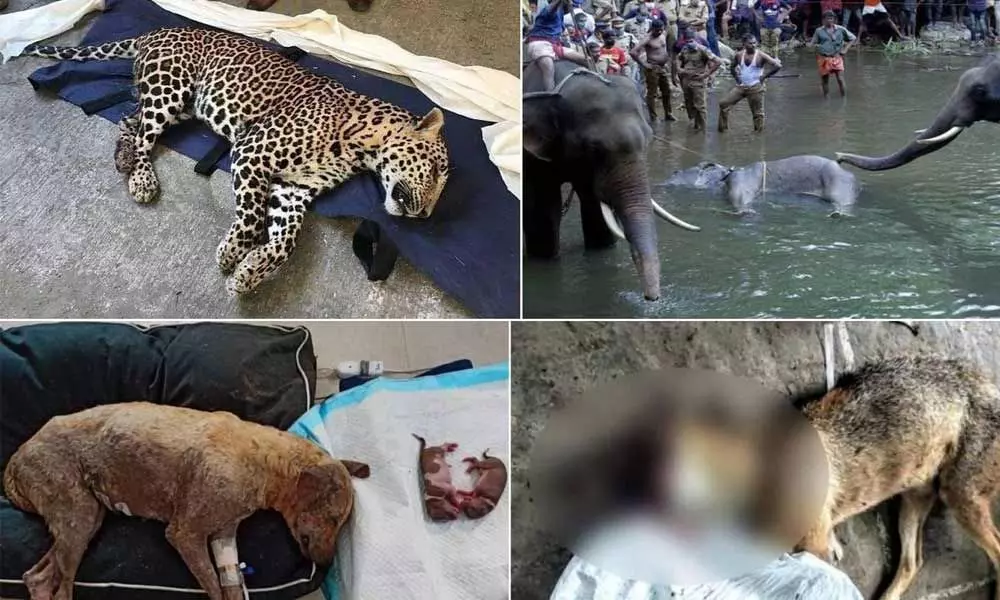Live
- They always want me to win, and now I feel lucky to have been offered a story like ‘Zebra’: Satyadev Kancharana
- ‘Democracy first, humanity first’: PM Modi in Guyana's parliament on two countries' similarities
- PKL Season 11: Telugu Titans register third straight win to top standings
- Is Pollution Contributing to Your COPD?
- NASA Unveils Underwater Robots for Exploring Jupiter's Moons
- Additional Central forces arrive in violence-hit Manipur
- AR Rahman and Saira Banu’s Divorce: Legal Insights into Common Issues in Bollywood Marriages
- 82.7 pc work completed in HPCL Rajasthan Refinery area: official
- Curfew relaxation extended in 5 Manipur districts on Friday
- Tab scam prompts Bengal govt to adopt caution over fund disbursement
Just In
Man-animal conflict in India getting too close for comfort


Man-animal conflict in India getting too close for comfort
Dogs and monkeys -- the first, man's oldest friend from the animal world, and the other, man's closest relation from the animal world, loved and revered as an epitome of faith in the Hindu lore
Dogs and monkeys -- the first, man's oldest friend from the animal world, and the other, man's closest relation from the animal world, loved and revered as an epitome of faith in the Hindu lore.
But, no less than 300 stray dogs are estimated to have been killed by poisoning in a small village in Andhra Pradesh around a fortnight ago. And, around the same time, in neighbouring Karnataka, at least 60 monkeys were found in gunny bags strewn along a country road one fine morning. Found dead or dazed, the simians are believed to have been drugged before their capture.
Predictably, the grisly incidents provoked a hue and cry in several quarters. Animal rights activists took up the matter in Andhra Pradesh, and local police reluctantly filed a case in the matter, finally. In Karnataka, the High Court taking suo motu cognisance, ordered an enquiry into the killings of the monkey.
While a few persons, belonging to traditional animal-trapper communities, have been arrested in Karnataka for the monkey murders, in Andhra Pradesh, the perpetrators have been identified as tribals who are animal hunters. Both cases show certain disturbing similarities. In Andhra Pradesh, the animal rights activists have pointed their fingers at the village panchayat officials for ordering the disposal of the stray dogs which were overrunning the village.
In Karnataka, the monkeys were trapped and being transported away, allegedly at the behest of villagers fed up with the monkey menace to their crops. While instances of cruelty meted out to animals regularly make their way to news headlines, these have generally been isolated cases involving individuals or small groups. In contrast, the recent incidents in Andhra Pradesh and Karnataka are a 'commissioned' crime. The one, by concerned village officials, and the other by irate villagers.
The scale and planning involved in these 'organised' pogroms, raises concerns and questions. The man-animal conflict over dwindling habitats is no longer about 'wild' animals like leopards, tigers, and elephants alone, but has expanded to include domesticated species and species that have acclimatised to urban surroundings, which are home to humans.
So, how big a problem is the issue of cruelty to animals? Is it a problem in the making? While the Central government does not maintain records of crimes against animals, the Animal Welfare Board of India compiles data on complaints on reported cruelty to animals.
Compared to 155 cases that were reported in 2014-15, the numbers grew to 228, 256 and 225 respectively in the next three years. Following a comparative lull in 2018-19 when 144 cases were reported, the numbers grew to 300 in 2019-20, 383 in 2020-21, and stood at 210 in the first seven months of 2021-22. The above figures may just be the proverbial volcano's tip, and not exactly reflect the ground realities because it is a given that every case of animal cruelty is not recorded. Secondly, these are just a number of cases filed, and do not detail the numbers of animals subjected to cruelty. Take for instance, the case of the 300 dogs killed in Andhra Pradesh, or that of the 60 monkeys in Karnataka.
The abysmally low penalties and punishments laid out in the law, are also a factor fuelling acts of cruelty against animals. For instance, a Rs 50 fine is the highest penalty for a first offence under The Prevention of Cruelty to Animals Act, 1960. "Dogs are poisoned, cows have been burned with acid, and countless other animals across India are abused every day -- and the current penalties are often not enough to deter people who want to harm them," states PETA India in its online campaign that demands a relook at the outdated deterrents for cruelty against animals.
For all the problems that semi-domestic stray animals like dogs, cats and even monkeys cause, they do come with some benefits. For instance, stray dogs and cats, play an important role as natural scavengers that keep rodents and disease at bay. Eliminating them totally means inviting new problems, apart from the ethical issues involved in such flagrant vigilante responses. The man-animal conflict certainly seems to have come closer home, possibly, a bit too close for comfort.

© 2024 Hyderabad Media House Limited/The Hans India. All rights reserved. Powered by hocalwire.com






